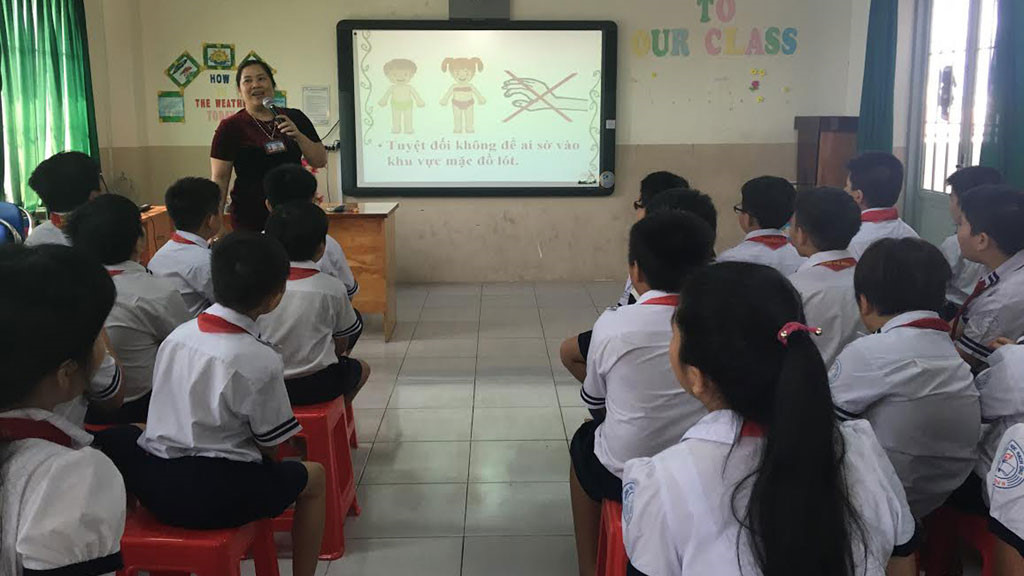Despite Vietnam’s deeply rooted patriarchal norms, there is cause for optimism among Vietnamese feminists, argues contributor Luu.
“With 300,000 lives taken every year, Vietnam is entering one of the worst humanitarian crises in history. We regret not having done anything about this earlier!”
Wait, really? What humanitarian crisis? Brace yourself for the answer: ABORTION.
Using inflated language that easily manipulates ill-informed audiences, two male, pro-life campaigners – Le Huynh Ha and Le Hoang Thach – talk about the criminality of abortion in a promotional video, a part of their campaign to advocate for more restrictive abortion laws in Vietnam, where abortion is allowed until the twenty-second week of pregnancy. Framing abortion as a barbaric act, the campaign is dubbed “Mama Don’t Kill Me!” and seeks to gather as many as 100,000 online signatures to push for revised legislation of abortion.
Why only moms? Don’t dads play a role in conceiving babies as well? And, if abortion is as ethically unacceptable as the campaign makes it sound, shouldn’t men also be held accountable? When critical netizens pointed out the absence of fathers from the campaign’s narrative, founder Le Hoang Thach equivocated, “Stop picking on my use of language. Language doesn’t matter. What matters is what this campaign delivers: justice for unborn lives.” The missing male figure in the narrative of the campaign, however, is not insignificant but unmasks a long legacy of sexism and conservtaive views on sex in Vietnam.

The founders of the “Mama Don’t Kill Me” campaign appearing in their promotional video (Photo: Bao Moi Newspaper).
What they talk about when they talk about sex
Many in Vietnam are still divided on what sex and sexuality should be and how it should be regulated. Older Vietnamese see sex as a taboo, oppose premarital sex and emphasize girls’ chastity and modesty. Younger generations, influenced by Western ideals, tend to have much more tolerant views of sex. According to a 2017 study released by Biomed Central Health on parental perceptions of teenagers’ sexuality in Vietnam, the number of youths engaged in premarital sex actually increased from 36% in 2002 to 44% in 2009.
Not all youths believe in gender equality, however. Patriarchal norms still persist in the country despite the spread of liberal ideas. Socialized into toxic masculinity, many young men still unconsciously share with their elders the same unfavorable views towards women who lose their virginity before marriage. While they take premarital sex with their girlfriends as a given, they often feel qualms about marrying those who have lost their virginities to other men. Unconsciously viewing women as men’s possessions, many Vietnamese men do not want their wives to be “used” by other men.
Increasing numbers of sexually active youths in Vietnam over the recent years have sparked concerns and gender consciousness alike, giving rise to more sex education programs at schools. These programs, however, remain sexist and inadequate. Worn-out truisms that most girls have probably learned by heart by the time they reach puberty are preached again and again: refrain from teenage sex, say no to boys’ sexual advances, act and dress modestly around boys, and do not get pregnant. There are few instructions on how boys should behave around girls, much less guidelines on contraceptive methods that instructors fear will only encourage teenagers to have more sex. In short, sex is still perceived as a taboo that teenagers, especially girls, should be talked out of rather than a natural part of the human experience that needs to be taught properly.
How illiberal sex views and misogyny rationalize abortions
Consequently, though contraception is widely, legally accessible in Vietnam and people generally hold no religious views against it, it fails to prevent unwanted pregnancies. Youths either lack knowledge of how to use condoms and oral contraception or shy away from purchasing them in public places. Moreover, the contents of most sex-ed programs reify the socially constructed image of males as innately, sexually aggressive and girls as asexual individuals. Boys are therefore justified in their sexual desires while girls are condemned for their carnal pursuits. Chastity becomes a moral code that girls must aspire to, and it is girls’ double responsibilities to keep both theirs and boys’ behaviors appropriate.
So in Vietnam when women fail to conform to these misogynistic moral codes, they bring upon themselves such contempt that men rarely receive for the same behaviors. In Vietnam, so much importance is placed on virginity and chastity – core components of women’s morality that premarital pregnancies easily become the talk of intrusive neighbors. Often, the girl is the only one castigated when news of her illegitimate pregnancy breaks out. As the talk carries on, there is little mention of the boy and his negligence in wearing condoms, nor are there efforts to censure him for having evaded responsibility for what he has done. All eyes are on the girl who has trespassed a line she should not have, often incentivizing her and her family to seek abortions. Pregnancy precaution measures have become a girl thing since girls are the only one to deal with the consequences of unwanted pregnancies, which leave “marks” on their bodies. Boys can afford to be negligent since they face no consequences, or so society has made it the case.
Restrictive abortion laws that are geared towards women’s behaviors while leaving men out of the picture are not borne out of concerns for unborn lives as the founders of Mama Don’t Kill Me proudly proclaimed. Instead, their anti-abortion ethics reflect sexist attempts to force women into molds of men’s own making, holding them up to rigid ideals of a chaste woman they may not have the desire to live up to. Sex-ed programs and daily lessons from conservative adults sustain this sexist tradition while failing to address abortion at its roots. In fact, though in Vietnam women can legally obtain safe abortion services at public health centers, prevalent sexism in the country cause many to seek abortions at private, unsafe clinics to avoid being recognized, thus putting their own lives at peril. Clearly, sexist moral codes incentivize women to have more (often unsafe) abortions not less, and if we widen our scope of analysis, victimize women in many other ways.
It’s her fault
For example, recently, footage featuring a couple (the girl a 23 year-old, well-known celebrity among Vietnamese youths) having sex was leaked onto social media. Responses mostly center on the girl’s moral looseness. Women grow anxious over what they see as the girl’s immoral acts and are unsparing in their condemnations. Men quickly share the video that seriously infringes on the couple’s privacy rights, passing rude comments mostly on the girl’s body and so-called lasciviousness. When the female victim takes to social media and warns these men of their wrongdoings, many boldly quip that no police can get a hand on them, not realizing that they are in the wrong.

Actress-singer Hoang Thuy Linh, whose reputation was damaged after her private video was leaked, in a recent TV show (Photo: Vietnammoi Newspaper)
This incident is reminiscent of an even bigger scandal in 2007 in Vietnam. The reputation of aspiring, hugely popular 19-year-old actress Hoang Thuy Linh was sabotaged overnight when footage of her making out with her boyfriend was leaked online. Most parents were critical of her supposed lack of propriety and expressed concerns that she would be a bad role-model for teenagers, denouncing the then immensely popular teenage TV show in which she played the main character. Placed under extreme stress, the singer eventually pulled out of the show and even issued an apology although she had done absolutely nothing wrong: both she and her boyfriend were over 18 years of age at the time they had sex, which is perfectly legal under Vietnam’s law. It took her a decade to establish a new career as a singer, rebuild her reputation and work her way into success again.
Systematic sexism is also recorded in a recent inforgraphic by ISEE – The Institute for Studies of Society, Economics, and Environment based on their research on gender equality in Vietnam. According to the institute’s findings, accounts of sexual harassment and assault incidents in both newspapers and social media purposefully use phrases such as “walking alone at night”, “intoxicated”, and “talking to a strange man” that invite victim-blaming behavior. Had they strictly followed the course of actions designated for women – that is to be modest and chaste – these accounts seem to say, such mishaps would not have taken place.
From a sexist campaign gone awry to greater gender consciousness?
Neither Mama Don’t Kill Me nor many other anti-abortion discussions that it represents truly seek justice for unborn lives as claimed. Rather, these represent attempts to advance a male-centric notion of a womanhood intimately linked to chastity and to forbid women from doing what men are given leeway to – the very attitudes also reflected in the aforementioned scandals and ISEE’s recent report. Interestingly, despite its sexist message, the campaign also inadvertently sparks greater gender consciousness in Vietnam and prompts people to be more vocal about sexism. Before the campaign was launched, there was admittedly little public debate on abortion in Vietnam, and misogynistic ideas in anti-abortion debates and other aspects of life are hardly detected and critiqued, thus sustained. Despite the sweep of feminist movements around the world and in Asia, most notably the #MeToo movement, there is no such movement in Vietnam due to the government’s hardline stance on mass-assembly and social movements in general.

The logo of the “Dad, please wear condoms!” campaign.
But the campaign has laid bare misogynistic social norms that Vietnamese people are often blinded to. In doing so, it makes them question hegemonic, male-centric values that they often take for granted. Throughout the few months that it was launched, the campaign met mostly with backlash from well-educated, feminist youths who critique its use of women as a scapegoat to evade bigger questions about structural sexism in the country. One critic even retaliated with a campaign “Dad, please wear condoms!” while many others published well-researched articles and blogs to bring to light the fallacies in the campaign’s sexist narrative. Despite claims to have gathered enough signatures to advance its anti-abortion agenda, the campaign soon fell flat.
So what are we to make of this campaign? Clearly, it alerts many Vietnamese to how deep-rooted sexism is in the country, which the campaign clearly has capitalized on. It gives people who might have been blinded to pervasive sexism in Vietnam a chance to identify and properly critique it. Backlash against the campaign also signifies that gender consciousness is gaining ground in Vietnam and feminists may take advantage of a growing interest in gender issues to advocate for greater equality. Sure, the campaign is a nuisance that we may want to get rid of, but the controversy that it ignites has prompted many Vietnamese to question sexist social norms that regulate their lives. Such critical attitudes, if sustained, may initiate a real feminist movement in Vietnam.
Luu is an International Relations student at a Japanese university, who writes for NOVAsia under a pen-name. Her interests include Cultural Studies, Gender Relations, and Media Representations. She believes that most problems in the world can be solved if people start adopting a more human-centric and environment-centric standpoint.
- “I Love My Body”: Hwasa and Female Empowerment in K-Pop and Korean Society - May 6, 2025
- English Fever in South Korea - February 24, 2025
- South Korea’s Medical School Expansion – Cure Worse than the Disease? - October 20, 2024






